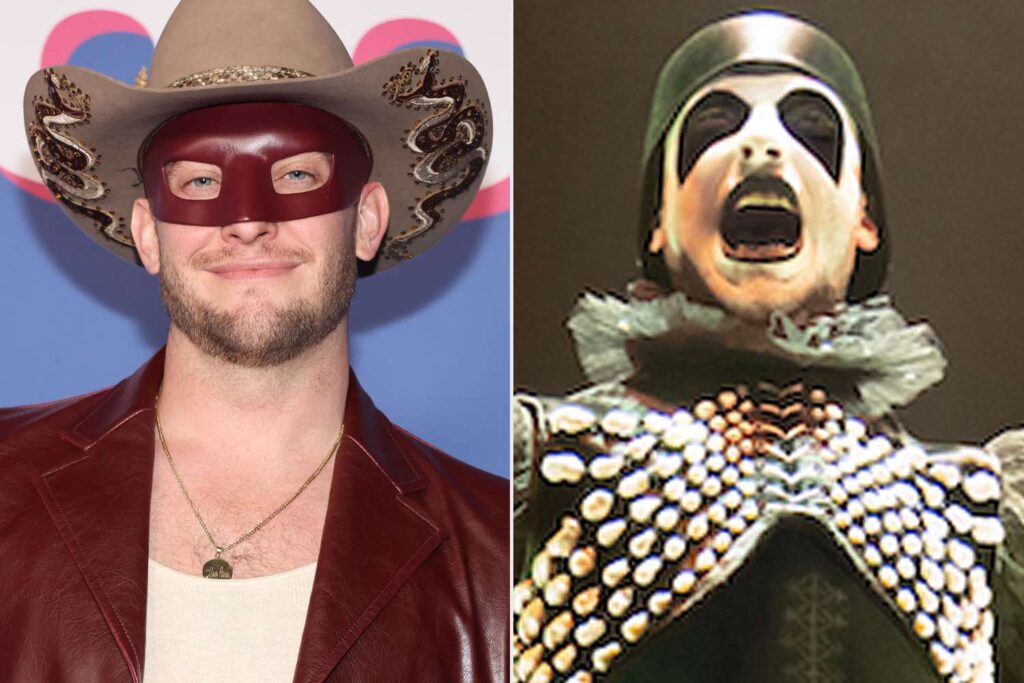NEED TO KNOW
Orville Peck is nearing the end of his Broadway run in the Tony Award–winning revival of Cabaret at the Kit Kat Club, but the queer country star isn’t quite ready to say “auf wiedersehen” to the iconic Emcee role.
“I’m having the best time of my life, really. It’s amazing,” the South African–born, Canadian-raised singer, 37, tells PEOPLE of leading director Rebecca Frecknall’s production of the landmark 1966 musical, currently running at the August Wilson Theatre in New York City.
Peck began performances opposite Grammy-winning theater star Eva Noblezada as Sally Bowles in March. Both will perform through July 20, with Billy Porter and Marisha Wallace taking over for their respective parts until the revival closes in the fall.
For Peck, starring on Broadway has long been a dream: Prior to launching his wildly successful musical career, Peck studied acting at the London Academy of Music and Dramatic Art (LAMDA) and worked in classical theater on London’s West End.
Julieta Cervantes
As he tells PEOPLE, he “absolutely” wants to return to the stage in New York City in the near future. “I’ll always be a multifaceted performer. I love the theater,” he says. “It has been so incredible to be back acting and I missed it so much. It is not the last time you’ll see me on stage.”
This revival of Cabaret is performed in the round with some of the audience just inches away from the stage. Did the intimate nature of the production make you less nervous about this being your Broadway debut?
Not really. I think it’s actually harder. You see the thing about it being in the round, even though, yes, it absolutely feels intimate, but there’s two things about that. Doing a musical in the round, the challenge is that your energy has to be going in 360 direction all the time. There’s no way to eat to one side or to rest your energy to one side. You have to be on the entire time. And especially for my role, a lot of times I don’t leave the stage. I’m sort of present watching scenes that are happening. You have to be aware of your entire body the entire time.
Julieta Cervantes
So that is a lot harder. And you feel like there’s a lot more scrutiny. You feel a lot more naked, I think, being in the round. It’s funny, I’ve played Madison Square Garden, and sometimes that feels easier playing to 20,000 people than playing to something that feels intimate because you’re so close up next to people. I think it was actually harder than if I was playing a huge Broadway theater or stadiums that I’ve done before. You are being intimate and vulnerable, and people are sitting 2 feet away from you. There’s a very vulnerability to that.
What make you take this leap to perform in Cabaret?
The thing I was really looking forward to was being able to explore a character and to tell the story that I’ve loved for decades now, and especially a character that I’ve wanted to play my whole life. I was excited to share a different type of vulnerability in this character, and especially a character that I think can be played many ways. I like to play with a certain kind of complexity, I think, that I don’t get to do in my regular shows, because then that’s just me telling my stories. I was excited to tell someone else’s story.
Julieta Cervantes
Some of your fans might be surprised to learn of your theater roots. Has it always been a goal of yours to return to the stage?
Yeah, definitely. I turned down some stuff over the years only because it didn’t feel like either the right time or the right project. But I knew that it was always a goal of mine to go back to theater, go back to acting. Broadway was of course the dream, and then this role in this show was the ultimate dream. It’s pretty special that it worked out the way that it did because I couldn’t have asked for a better return. But it was definitely always part of the plan. I think I’ve always considered myself a sort of multi-medium-type artist. I have a background in acting and dance, and, of course, music and many other things. I’m the kind of person who likes to keep busy and keep creating.
How did the plan live up to the actual reality of doing this show?
I couldn’t have dreamed of a better situation. It came sort of at the perfect time, I think, for me in terms of where I’m at as a performer, in terms of my confidence as a person, in terms of where I’m at, in terms of I got sober a couple years ago. I really figured out a lot about my life and about myself as a person. I don’t think I could have kept up with the stamina and the physical nature of the show if I hadn’t got all that sorted out. But I also think I wouldn’t have been able to be giving a dedicated performance in the terms of just fleshing out this character. I think me getting sober, especially, and taking time off of being a performer and finding out more about who I am as a person, I think that’s also made me a better performer and a better actor. I don’t think I would’ve achieved the kind of thing I wanted to if I hadn’t have done that beforehand. So it kind of all worked out, perfect timing. It is genuinely the hardest thing I’ve ever done, this show.
Julieta Cervantes
How is your voice keeping up?
My voice has been keeping up. It’s amazing. The first couple of weeks were difficult. I worked a lot on changing my placement of my voice. I’m singing in a much higher register than I typically sing in my regular stuff, which wasn’t a challenge because I have a pretty big range, but it was an area of my voice that I haven’t really accessed a lot over the years, last few years.
So a lot of work vocally. Also, I was very determined that I wanted to, as the show goes on and people will see, sort of change in intensity and change the brashness of my voice. So I do a lot of yelling towards the end of the show and a lot of raspiness, and that took some getting used to with my voice. I was definitely struggling at first. But now, it’s really held up and I feel like I’ve actually become a much better singer from doing this show, just because I’ve really worked hard at areas of my voice that I’ve sort of neglected before.
Has starring in Cabaret changed what you want to put out into the world as a singer in any way?
Yeah. I think for me, especially with my own music… Whatever I write for my own albums and my own music, it’s very much always dictated by what’s going on in my life, where I’m at as a person, where I’m at as a performer. So I would say I’m busy working on new music right now, and there’s definitely some added theatrical elements in there that probably crept in because of the nature of what I’m doing right now and enjoying right now. There’s definitely some songs that I’m exploring that part of my voice that I mentioned before. It all informs each other. Because for me, I don’t look at it as separate things. I just think of it all as sort of my art and it’s ever evolving. It definitely informs one another.
It was a thrill to see you unmasked in the show. What’s it been like to get out there on stage without your signature prop?
It’s interesting. I think because I am playing a character in the show and there’s so much that… Especially the fact that a lot of the things about the way that I play my Emcee is very different than who I am, so I feel like there is a certain element of removing myself from it. I didn’t even really think about it that much. Honestly, when I go out there, it’s not even on my mind ever. I forget that people are seeing my face. Because to me, I feel like this is me in Cabaret feels more like wearing a mask than me wearing my mask in my concerts, if that makes sense. When I go on as the Emcee, I feel like I’ve got all this makeup on and wigs and costumes. I don’t even feel like I’m showing people my face, to be honest. But, definitely, it does strike me sometimes that people are maybe surprised by having seen my face, or that’s a thrill, and it’s funny. But honestly, I don’t think about it that much, which is probably helpful, because it allows me not to spiral a bit.
What went into the choice of putting the mask back on for the curtain call?
It’s sort of two things. It’s like me coming back out as myself as everyone else does when they come up for curtain call. They drop the character and they bow as themselves. I sort of wanted to add the extra sort of emphasis that that is the disconnect, now it’s back to me. But also, people tend to take photos during the curtain call and I wanted to still maintain my anonymity of my face. So that was also part of it.
Dia Dipasupil/Getty
Cabaret is one of the most revered musicals — and also one of the darkest. How has the weight of the show and its themes impacted you?
One of the biggest challenges of the show that I didn’t even really anticipate is that it is really emotionally taxing. I know a lot of actors and stuff love to talk about this kind of thing. But I think given just what we are living at the moment and the parallels that we’re seeing in our own society right now, it’s really heavy. Also being in the round, being so intimate and close to the audience, there’s shows where people sob through the entire second act. There’s shows where people walk out, where people scream at us, because they see a swastika appear on stage.
It’s really intense. We see a lot of people experiencing all manners of trigger, and it’s a lot. It’s part of what comes with, I think, doing, like you said, a show that is obviously heavy and dark and about important things. Given the time right now it is extra heavy, and we definitely all feel it in the cast. There’s sometimes when we do a two-show day. After the second one, I get home, and never mind how physically tired I am, I just feel so emotionally drained because it’s a lot. It’s a hard story to tell. And it’s hard that it’s the story that we’re all living right now.
Tickets for Cabaret at the Kit Kat Club are now on sale.

